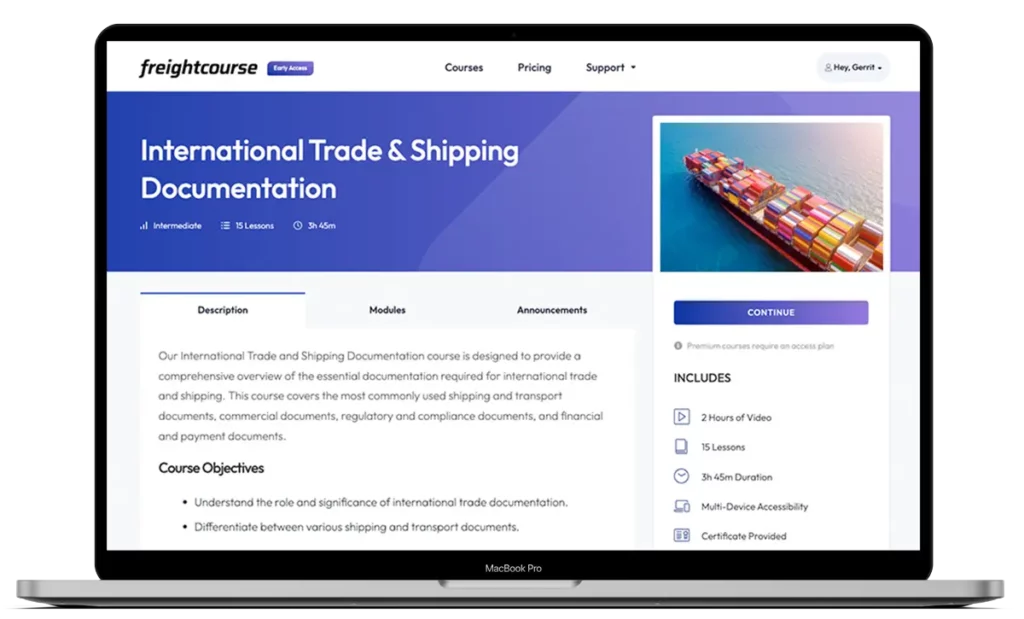When it comes to moving cargo via sea, carriers typically issue a bill of lading (BL) to shippers. A BL is a binding contract, document of title, and proof of carriage for transportation, in which the carrier assumes liability at cargo handover. However, in certain scenarios, carriers may want to indemnify themselves of liability due to various reasons. This is where a Letter of Indemnity comes into play.
A Letter of Indemnity (LOI) in shipping is a document that exempts carriers from any form of liability and possible claims that arise through contractual changes, possible damage to the cargo, additional expenses or other negative impacts. A shipper typically issues an LOI, when it’s requesting a carrier to operate outside its standard practices.
In this article, we will explore the topic of LOI in detail and illustrate in which scenarios they are most commonly used. We’ll also discuss what aspects a letter of indemnity covers and show how an LOI is structured using an example.
7 Main Reasons for Using Letters of Indemnity in Shipping
A letter of indemnity is mainly used when the carrier is requested to step out of its standard contractual obligations, at the request of the cargo owner (also the signatory of the LOI). Below are the 7 most common scenarios in which an LOI is used.
1. Cargo Release without Bill of Lading
Under normal circumstances, carriers release the cargo to the owner upon presentation of the Original Bill of Lading (OBL). There are certain scenarios where the original BL may not be available at destination upon arrival of the vessel.
This is a common case for shipments with short transit times, where the couriering of shipping documents exceeds the time the vessel requires to reach the port of discharge. Under these circumstances, the shipper can opt to have the cargo released at the destination to the consignee, without surrendering the BL.
This can be done through issuing a letter of indemnity to the carrier. In this scenario, the LOI protects the carrier of liability when it releases the cargo to the nominated party that is indicated by the shipper. This allows the consignee to secure the cargo without having to wait for the BLs, which could save costs.
Therefore, LOIs are a convenient way to request a carrier to release the cargo through non-standard procedures. However, take note that there are also other alternatives, such as requesting extra free days of port storage and demurrage until the original documents are in the hands of the consignee.
2. Cargo Release for Lost Bills of Lading
In the case of a lost bill of lading, the consignee is not able to collect the goods at the destination. In order to avoid delays, the shipper is able to issue an LOI indemnifying the carrier from any risks of releasing the cargo without presentation of the original BLs or requesting to issue another set of BLs.
In addition to that, the shipper would need to provide the reasons for the loss of the OBL and agree to shouldering possible costs if incurred. The most important point is to absolve the carrier from any claims in the event the lost OBL is found and surrendered to the carrier for release.
Execution of an LOI does not in any way change the conditions of a transportation contract, and therefore carriers seek complete indemnity.
3. Cargo Delivery to a Port Not Stated in the Bill of Lading
When cargo has been shipped on board, the port of origin, port of discharge and final destination have already been finalized. If there is a change of destination, an ocean carrier will request an LOI from the owner of the goods, clearly indicating the request and agreeing to pay for additional freight charges.
The cargo owner must also surrender the initially issued bill of lading. Once the LOI has been acknowledged by the carrier, it can now proceed to transport the goods to the new destination free of any liability.
4. Shipments with Split Bills of Lading
In the event where a split bill of lading is requested by the cargo owner, an LOI may be requested. This is because the initial set of BLs indicate the original shipper, consignee and notify party.
While some carriers may just issue a split BL and simply charge a fee for this, other carriers may insist on an LOI, especially after the shipment has been loaded and the vessel has already departed.
5. When Carrying Additional Crew on Vessel
Ocean vessels have a nominated crew that operates and maintains the vessel. However, in the event other personnel are on board, the vessel operator may request for an LOI to exempt themselves from possible accidents to non-crew personnel.
6. Equipment Related Agreements
LOIs are also commonly issued in scenarios where carriers are requested to handle special types of equipment or cargo types. A letter of indemnity in this scenario ensures that the carrier is exempt from liability for cargo or equipment mishandling.
- Reefer Cargo – Assuming the cargo has already gated in or is loaded onto a vessel with a specific temperature setting and is found to have a discrepancy in temperature, it would be in the best interest of the carrier to secure an LOI from the owner of the goods. This LOI would acknowledge the discrepancy and indemnify the carrier from any cargo damage due to the temperature discrepancy.
- Heavy Cargo – an LOI can also be issued by the shipper to indemnify the carrier against any damage caused by moving overweight or unevenly distributed cargo that could result in possible damage during vessel loading/unloading.
7. Other Types of Agreements
There are also other types of LOIs that are requested by carriers that cover various other scenarios.
- Change of Shipper – The shipper indemnifies the carrier from possible disputes, claims, or losses for the change of shipper.
- Sea Waybill / Telex Release – For shipments with short transit times, a shipper can indemnify the carrier for releasing the shipment without surrendering the Original Bills of Lading (also if there is a telex release).
- Unclaimed Cargo – If the owner of the goods does not take delivery or is found to be non-compliant to local laws the costs related to storage, demurrage, transportation, fines, penalties, and disposal, the LOI would indicate that this will not fall under the carrier’s responsibility.
What Aspects Need to Be Covered In an LOI?
It’s important for an LOI to cover three main aspects. It should clearly indicate all parties involved, the type of indemnity and the arbitration. As the carrier is the party assuming most of the risk during the transportation, it’s important that they clearly identify if all aspects are covered.
The shipper and consignee on the other hand, need to ensure that they are comfortable waiving the right to claim any damages or fees against the carrier. Here are the three most important aspects that a letter of indemnity in shipping should cover:
- Parties Involved – Parties should include the signatory, who is typically the cargo owner or shipper, the carrier who is indemnifying liability and in certain scenarios a consignee.
- Indemnification – The LOI should also indicate to what degree the carrier is indemnified. Most commonly, carriers seek complete exemption of liability.
- Arbitration – In the event of court proceedings, an LOI should indicate in which country the arbitration will be heard. This is typically the country of the port of loading, where the LOI is issued and signed.
What are the Risks of LOIs in Shipping?
It’s important to know that an LOI also has certain risks associated with it. The first risk is the coverage it actually provides and the second risk is its legal enforceability.
- Coverage – Whenever a carrier accepts an LOI, it must ensure that the shipper clearly establishes the request and also that it exempts the carrier of any liability. It must also do its best to ensure that the shipper is able to pay, in the event of any additional charges or claims.
- Enforceability – An LOI is not enforceable if the carrier acts in bad faith or if it antedates the bill of lading. For example, if the carrier knowingly misdeclared the description, weight, quantity, and other possible causes, an LOI would not be enforceable. Secondly, the LOI should only be issued after the contract of carriage is issued.
Example of a Letter of Indemnity for a Lost Bill of Lading
Here is a case from a company based in Singapore that is shipping products to Los Angeles, USA. The shipper, ‘Base Camp Toys’ was issued an original set of BLs by ‘Starline Shipping’.
In this example, the shipper had unfortunately misplaced its BLs and had decided to issue an LOI to its appointed carrier. In the letter of indemnity, it’s requesting the carrier to release another set of BLs, so that ‘Base Camp Toy Store’ is able to collect the cargo.
Letter of Indemnity
Starline Shipping, the Carrier, the owners of the Vessel (collectively, the “Indemnified Parties”)
- Vessel Name: Starliner Adena 001w
- Port of Origin: Singapore
- Port of Discharge: Los Angeles, USA
- Description of Goods: 1 x 40 HC STC 150 Boxes Kids Toys
- Shipment Reference: STR 33415
- Container Number: CBHU 9965041
- Bill of Lading Date and Place of Issuance: June 12, 2021 – Starline Shipping
The shipment with reference STR 33415 and container number CBHU 9965041 was shipped on board vessel Starliner Adena 001w. We, Base Camp Toys, are confirming that Starline Shipping have issued us a complete set of OBLs (“Original Bills of Lading”) for the respective shipment.
However, due to dereliction of duties, a logistics operation officer has misplaced the Original Bill of Lading. Therefore, we are requesting Starline Shipping to issue a duplicate set of the Original Bill of Lading (“Replacement Bill of Lading”) and to facilitate the delivery to the consignee, Golden Gate Toy Store in Los Angeles, United States, without having to produce the original Bill of Lading.
In consideration of this request, we agree to the following:
- We indemnify Starline Shipping and its agents, and will not hold you liable for any loss, damage or additional expenses that arise through this request.
- This letter of indemnity shall be governed by the local law where the LOI is issued
- Should any of you successfully sue to enforce this Letter of Indemnity, Base Camp Toys agree to pay all legal fees and additional expenses that are a result thereof.
- The Authorized Signatory has the legal authority to represent Base Camp Toys and confirms all of the information submitted in this LOI to be true and accurate.
_____________
Authorized Signatory

Get Free Course Access
If you enjoyed the article, don’t miss out on our free supply chain courses that help you stay ahead in your industry.

Gerrit Poel
Co-Founder & Writer
at freightcourse
About the Author
Gerrit is a certified international supply chain management professional with 16 years of industry experience, having worked for one of the largest global freight forwarders.
As the co-founder of freightcourse, he’s committed to his passion for serving as a source of education and information on various supply chain topics.
Follow us